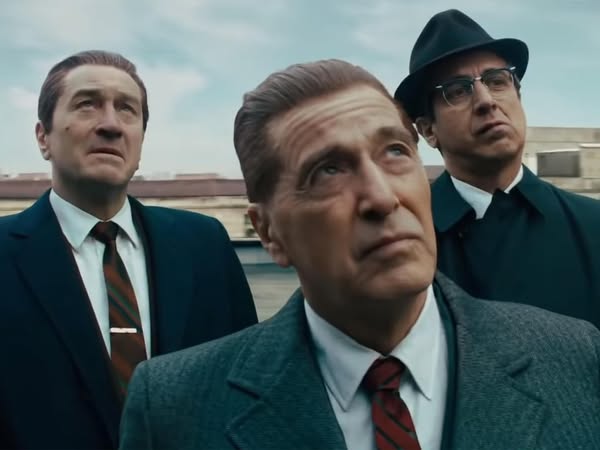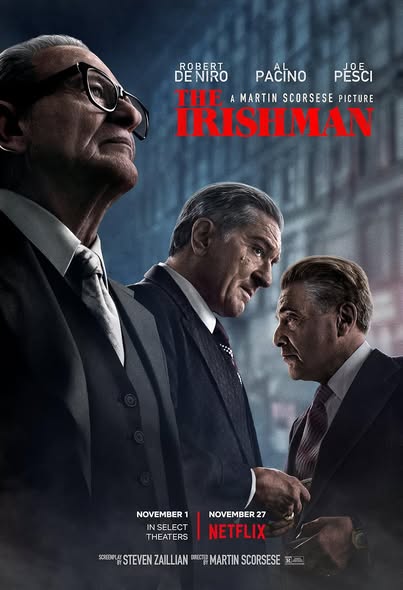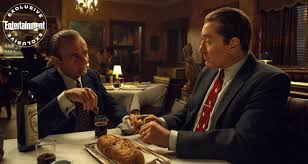
The Irishman (2019) is a sprawling epic that intricately weaves together themes of loyalty, regret, and the passage of time within the context of organized crime. Directed by Martin Scorsese, this film marks a significant return to the genre that has defined much of his illustrious career. Adapted from Charles Brandt’s book I Heard You Paint Houses, the film explores the life of Frank Sheeran, a hitman who reflects on his involvement with the Bufalino crime family and his connection to the disappearance of labor leader Jimmy Hoffa.
The narrative unfolds through Sheeran’s perspective, portrayed hauntingly by Robert De Niro. As an aging man, he recounts his life of crime, beginning with his early days as a truck driver who becomes entangled in the world of the mafia. De Niro’s performance captures the complexity of Frank’s character—his internal conflicts, his sense of duty to his mob bosses, and the profound loneliness that accompanies his choices. The film’s nonlinear structure allows for a rich exploration of Frank’s relationships, particularly with Hoffa, played by Al Pacino, and his mafia boss, Russell Bufalino, portrayed by Joe Pesci.
One of the film’s defining features is its meditation on time and memory. As Frank reflects on his past, the film delves into themes of mortality and the consequences of a life steeped in violence and betrayal. Scorsese deftly portrays the passage of time through both visual and narrative techniques, using aging makeup and digital de-aging technology to depict the characters at different stages of their lives. This innovative approach invites viewers to consider how the weight of one’s choices accumulates over the years, leading to a poignant exploration of regret and the fleeting nature of life.

The film’s pacing is deliberate, allowing for moments of introspection and character development. Scorsese’s direction emphasizes the quiet moments amidst the chaos of mob life, highlighting the emotional toll that such a lifestyle takes on individuals and their families. The dialogue is rich and layered, filled with subtext that reveals the characters’ motivations and the moral ambiguities inherent in their actions. The interactions between Frank, Hoffa, and Bufalino create a tense atmosphere, underscoring the fragility of loyalty in the world of organized crime.
Visually, The Irishman is stunning, with cinematography by Rodrigo Prieto that captures both the grandeur and the grittiness of the settings. From the bustling streets of post-war Philadelphia to the somber interiors of mob hangouts, each frame is meticulously crafted to immerse the audience in the time period. The film’s production design and attention to detail transport viewers to the mid-20th century, enhancing the authenticity of the narrative.

The score, composed by Robbie Robertson, complements the film’s tone, weaving together haunting melodies that echo the themes of loss and nostalgia. The music enhances the emotional resonance of key scenes, drawing viewers deeper into Frank’s psyche and the weight of his past decisions.
The Irishman also explores the theme of legacy, particularly through the lens of Frank’s relationships with his family. As he navigates the treacherous waters of his criminal life, the impact of his choices on his daughters and the estrangement that follows become increasingly apparent. This familial aspect adds depth to the narrative, prompting viewers to consider the cost of loyalty to the mob versus the loyalty to one’s own family.

In conclusion, The Irishman is a monumental film that serves as both a reflection on the organized crime genre and a profound meditation on life, death, and the choices that define us. Scorsese’s masterful storytelling, combined with powerful performances from De Niro, Pacino, and Pesci, creates a cinematic experience that is both engaging and thought-provoking. The film challenges viewers to confront the moral dilemmas faced by its characters while offering a poignant commentary on the passage of time and the weight of one’s legacy. In its exploration of loyalty and regret, The Irishman stands as a significant achievement in modern cinema, solidifying Scorsese’s place as a master storyteller and leaving a lasting impact on the landscape of film.